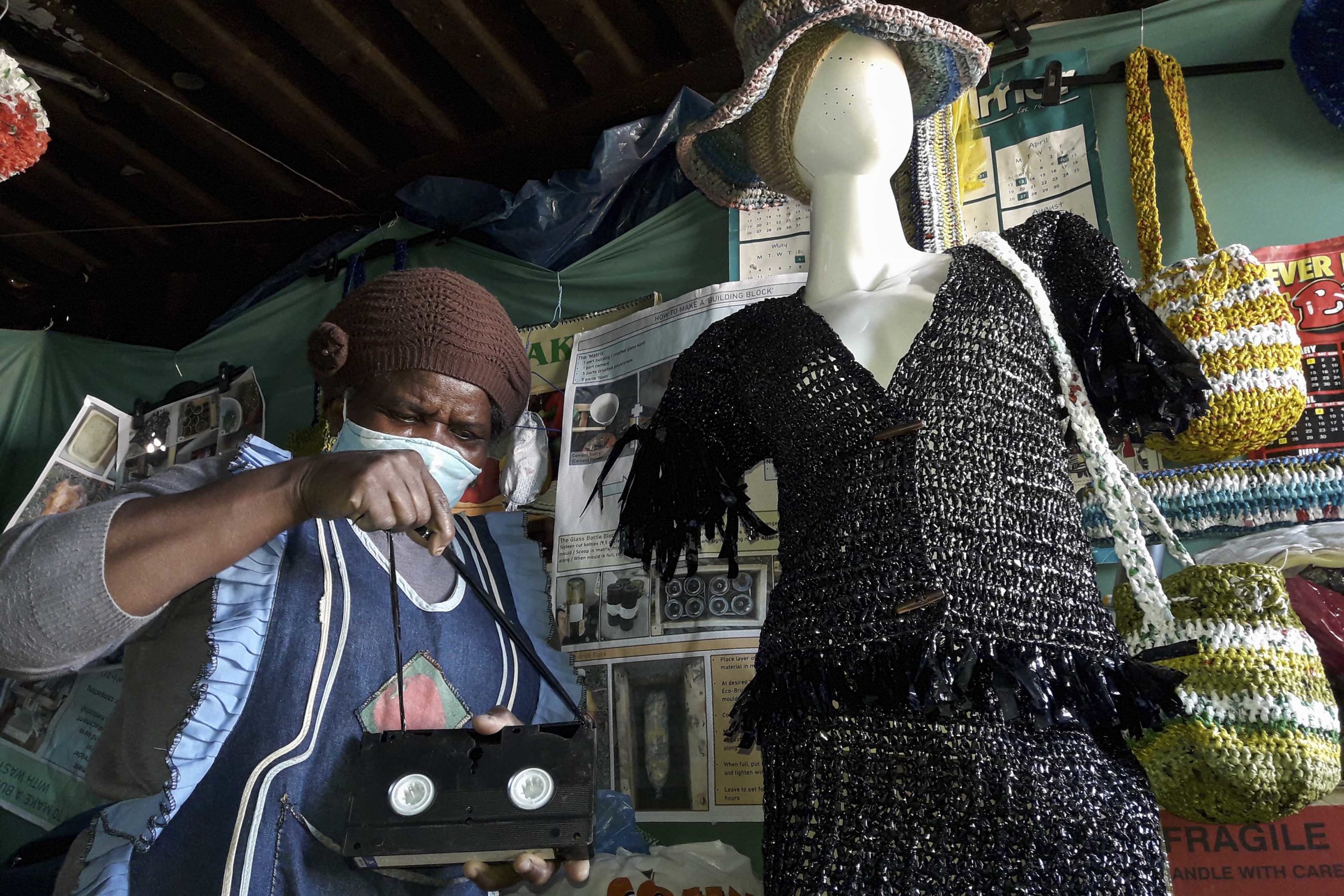Women master the art of achieving a greener future
Amid crippling unemployment and a degraded environment, the members of a recycling project in the Eastern Cape help to clean a township and provide an income for themselves.
Author:
26 August 2021

The Noziqamo recycling project in Motherwell, a crowded township in Gqberha in the Eastern Cape, is run from four rusty shipping containers standing on a piece of open ground. Originally, it was meant to be a sewing and knitting initiative that would empower women in this impoverished area. But, concerned with the pollution and litter around them, its members’ focus evolved as they set out to clean their environment.
Armed with plastic bags, masks and gloves, they started picking up rubbish from open fields and dump sites across the large township. Realising the need to reuse some of the waste, the group asked for help from environmental organisations such as the Zwartkops Conservancy and Sustainable Seas Trust, which held workshops to teach them more about recycling and upcycling. This has meant they can combine their craft skills with eco-friendly initiatives.
“The workshops helped us a lot because we learnt so much. We have also become instructors and we sometimes travel to Limpopo and Johannesburg to facilitate workshops,” said Thenjiwe Jacobs, 62.
The women never imagined working with refuse. “Some people would be ashamed to be seen picking up garbage, but I was not. I even had my grandchildren join me when I was at home. My house now has large bags of garbage all over the yard. I do this because I love it,” she said.

Jacobs resigned from her job as a salesperson at a retail store to start the Noziqamo project in 1999. “I was tired of working. I started working when I was a teenager because my father fell ill and my mother was a domestic worker. She couldn’t take care of everything, so I was forced to quit school and start working,” she said.
Realising her passion for sewing was a common interest among unemployed women in Motherwell, Jacobs set out on her mission to empower them. Starting with only three women who were working from home, the sewing project slowly got off the ground and eventually ended up in the shipping containers.
“I went and bought offcuts at local retail stores, and another fabric store would often donate offcuts to us. We would sew a lot of items and then started selling these in rural areas. We were the first vendors to set up vending stalls in Addo,” said Jacobs, referring to the small town about 70km northeast of Gqberha.
A change in focus
A new horizon emerged for the project’s growing number of women when they met Jenny Rump, environmental officer of the Zwartkops Conservancy, who started providing them with fabrics for sewing and opened their eyes to the possibilities of using recycled materials to expand their offering. For Jacobs, a trip to Johannesburg changed everything.
“I saw people dragging huge bags across the city and I became curious. I asked them what they were recycling and whether it made them a lot of money. They said yes. I came back home and told the other women in the project about it,” she said.
The members started collecting recyclable material such as glass, plastic, cardboard, paper, aluminium, vinyl records, wood and plastic in the open areas in Motherwell. “Zwartkops Conservancy would also help us by bringing us bags of garbage [we could use],” said Jacobs.

With the help of workshops on eco-friendly arts and crafts, the women were able to merge their sewing and recycling. They began using recycled materials in their clothing and other items, and also mastered making eco-bricks for construction. Their creativity has even resulted in some of their work being displayed at the National Arts Festival in Makhanda.
Already skilled in facilitating workshops, the women have begun training three young artists who have shown great interest in their work. They also teach young people about recycling and using recycled materials in arts and crafts.
“When we make a big sale, we employ young people to come and help us clean the workspace,” said Nosizwe Dingaan, 56. “It’s cluttered because we work with so much refuse. We pay them what we can, at most R50. We also teach them some of the methods of reusing garbage.”
The story of many
According to member Nosipho Mayinje, 56, the women can only expand their efforts if they have machinery such as balers that compress waste and large weighing scales. But the project has received little government funding or support over the years, which has made it hard to attract more members and remain sustainable.
In 2018, the Department of Sport, Arts, Culture and Recreation gave it R 5 000. Last year, it received R3 000 from the Covid-19 temporary relief fund.
Their situation is similar to many small-scale community projects and non-profit organisations in the province, most of which have had great challenges with funding from government departments, before and during the pandemic, despite their contribution to social development and employment.
Be that as it may, the women of the Noziqamo project live in hope that they can one day achieve their dream of creating an “eco-hub” in Motherwell that can sustain their livelihoods. “We wish the project can be successful so that our children can be taken care of and so that we can make an honest living,” said Dingaan.

